As I walked out of Moana, I heard a guy who’d also just seen it talking to his wife and kids. “That was really a girl power movie!” he exclaimed. “Disney hasn’t really done that before!” And when I stopped to think about all the female protagonists of other Disney movies, the ones who progressively took steps toward empowerment but always fell just short, I realized he was right. Moana is the perfect heroine to usher in a new era for Disney, and her eponymous film is the perfect one to do the same.
I was lucky enough to be able to see the film at the El Capitan Theater, which is the Hollywood home for Disney films. Before each screening, they do a short live stage show that’s somehow related to the film. As part of it, they “introduced” Moana as the newest member of the Disney family, and she came out! Or, rather, a young woman came out playing her and doing a really energetic hula. As I watched her dance, it hit me: Moana is going to be at all the Disney parks now. She’ll be a flesh-and-blood character with whom children will be able to pose.
I thought about my last trip to Disneyland and remembered a black family I saw there interacting with Tiana from The Princess and the Frog. As the little girl was talking enthusiastically with Tiana, the dad was smiling at the mom, and the mom was crying. Tiana’s existence meant so much to all of them, enough that a child’s mother cried tears of joy over her daughter being able to experience this, and as I watched “Moana” dance, my heart swelled with the knowledge that she would mean a lot to some future Polynesian family.
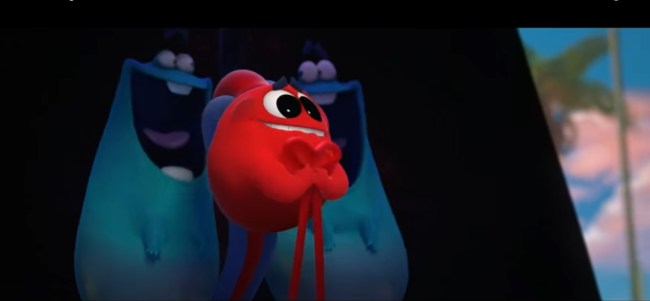
Before Moana started, however, we got to watch a short called Inner Workings, which Charline wrote about earlier this week. Directed by Leo Matsuda, it tells the hilarious, poignant story of a practical, careful man caught up in a battle between his head and his heart. When done well, animated shorts can pack an emotional wallop, and this one got the struggle between head and heart so right that I teared up! There’s no dialogue in the piece, and yet the relationships and the emotions are conveyed so clearly, and in hindsight, this was thematically a perfect short to pair with the feature presentation, as both films are about following your heart.
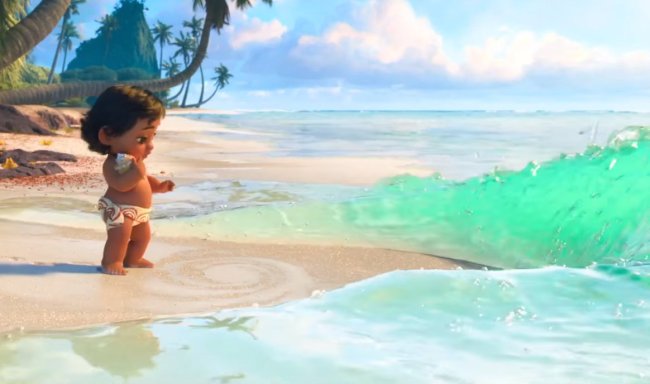
For centuries, the greatest sailors in the world masterfully navigated the vast Pacific discovering the many islands of Oceania. But then, 3,000 years ago, their voyages stopped for a millennium, and no one knows exactly why. With Moana, Walt Disney Animation Studios is attempting to use fiction to fill in that real-life plot hole.
Moana (Auli’i Cravalho) is a girl who loves the ocean, who is continually called to the ocean. In fact, the ocean is a really good friend of hers. However, life as the chief’s daughter means increased responsibility as she gets older, and as her people haven’t traveled beyond their reef for a thousand years, she’s encouraged to give up her dreams of going out to sea and stay focused on her people. Rather, her parents encourage her to give them up, while her badass Gramma, Tala (Rachel House), encourages her to think for herself and follow her heart.
At first, she follows her parents’ lead and begins learning how to be the next chief, but when her people’s lives are threatened by a dying island and no crops or fish, Moana takes it upon herself to figure out why. Then, with the help of an egotistical demigod named Maui (Dwayne Johnson) and a not-so-smart rooster named Heihei (Alan Tudyk, uttering zero human words), she embarks on a quest to save her people. In doing so, she learns more about herself and her identity.
I wasn’t expecting Moana to be a film at which I cried. It didn’t seem like that kind of movie, and yet I found myself in tears every two or three scenes or so. Sometimes, they were tears of joy. (Moana meets the ocean when she’s a toddler, and it’s the most heartwarming and hopeful thing ever!) Other times, they were tears of sadness. (There is loss in this film, and it’s handled beautifully.) Still other times, they were tears that welled in my eyes because there were moments that were just that inspiring.
A lot of it had to do with personal experience. I, too, am a brown girl from an island culture who grew up wanting more from her life and choosing a path for herself that didn’t seem to make sense to the rest of my immediate community. As the youngest in my family, I’m also the furthest away from my own culture and want desperately to know it better, and must take it upon myself to acquire that knowledge. I’m not Polynesian, but I identified with Moana’s journey, because in many ways, it reflects my own.
However, there’s more to it than that. So much of the emotional impact lies in the craft used to tell this story.
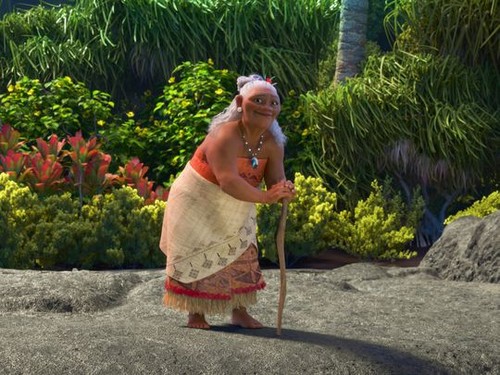
It’s clear the loving care the entire team took to “get it right” when it comes to the cultural aspects of the story, and so it didn’t feel like any other Disney movie. This wasn’t simply a familiar world sprinkled with a Polynesian flavor. It was a world that felt entirely different because it was from the point of view of a culture I had to get to know, and getting to know it was a joy. Jared Bush’s screenplay had heart, and humor, and tackled standard Disney devices in ways that were surprising and fun, as well as cut deep emotionally.
The voice performances were outstanding all around. Auli’i Cravalho as Moana is a star in the making, and it’s thrilling to know that this is what she’s capable of on her first film. Her passion and humor and sensitivity made Moana a heroine I look up to, even though there’s a huge age difference between us.
Dwayne “The Rock” Johnson is flawless as Maui, displaying a huge amount of range as he swings from a demigod’s overconfidence to the insecurity and fear that could belong to—dare I say it?—a mere mortal. The song “You’re Welcome” is a highlight of the film, and I can’t imagine anyone else’s voice bringing it to life.
And speaking of the music: Mark Macina’s score was gorgeous, but it was the original songs created by Lin-Manuel Miranda and Opetaia Foa’i that made the film sound unlike anything Disney has done before. You could hear Miranda’s influence most in the lyrics, and I heard glimmers of In the Heights and Hamilton in some of these words. And, of course, there’s a rapped portion of “You’re Welcome” that has Miranda written all over it. His words, as well as his facility with music of all types and from all cultures, were a perfect complement to Foa’i’s words and music. I found myself tearing up at just about every song, because the music swelled just so, or the words cut just deep enough. And I love how they took risks with the music, too. The song “Shiny,” sung by Jermaine Clement (A.K.A. one half of Flight of the Conchords) as a crab demon Moana and Maui face doesn’t have anything in common sound-wise with any of the other music in the film, and yet it fits perfectly (and is hilariously performed), because it makes sense in the moment for it not to be like the others.
In fact, Moana plays with different animation styles in this film, too. The CG animation is beautiful throughout, but what I love most is that depending on the moment or the mood, our main cast will be interacting with regular 2D animation or other styles that highlight the mood of a scene. Sometimes the results are hilarious, other times, they’re downright frightening, but I love that the team behind this film felt free enough to experiment and take chances, as it makes the film truly unique.
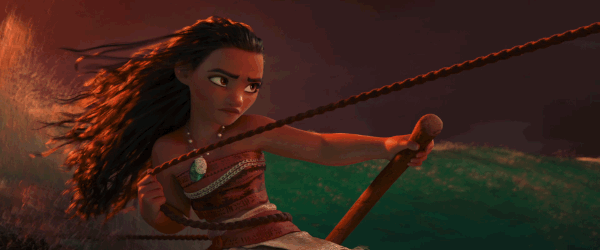
But as for that dad I mentioned at the top of this piece, what he said about this being the most “girl power” thing Disney has done is so true. Because Moana spends much of the film with her mother and Gramma talking about her life path and her identity, it passes the Bechdel-Wallace test over and over. And
But the “girl power” goes beyond that. Moana is never treated differently because she’s a girl. It is assumed that she, as her father’s only child, will become chief when he is gone, and he treats her accordingly. No one ever makes a comment about her gender in relation to her dreams or goals.
Even Maui, who is the only character who mentions gender at all, only mentions it in a way that shows how unimportant he thinks it is. He emphasizes that he’s not just a “hero of men,” but a “hero to all,” and when he calls Moana a “girl” it’s in the same breath as calling her a “mortal” and “child.” Her weakness isn’t based in her gender, it’s based in the fact that she’s human, and he’s a demigod. Moana makes her own decisions, and propels the action forward herself. The plot moves forward, because after the ocean chooses her, she chooses everything that happens next. One of the many things that brought tears to my eyes as I watched the film is that this is exactly the female adventure story I dreamed of, but never got, when I was a child.
Directors John Musker and Ron Clements (the directors behind films like Aladdin, Hercules, and The Great Mouse Detective) have really taken their work to the next level on Moana, and have taken their love of Polynesian culture and done something awesome with it, taking a five-year journey to travel, research, and get the input and participation of the people they want to represent.
The next step of course is for us to get to a place where there are enough people of all backgrounds telling their own stories. However, as an example of producers and directors giving other communities a platform and a voice, Moana shines. It’s a story that moviegoers young and old will be able to get lost in and enjoy. If you can, I’d highly recommend taking the whole family to see Moana this weekend. It’s exactly the kind of Disney movie we should be encouraging.
Want more stories like this? Become a subscriber and support the site!
—The Mary Sue has a strict comment policy that forbids, but is not limited to, personal insults toward anyone, hate speech, and trolling.—
Follow The Mary Sue on Twitter, Facebook, Tumblr, Pinterest, & Google+.



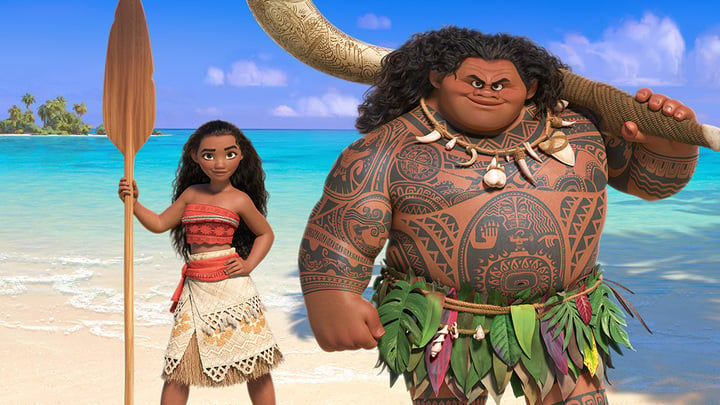





Published: Nov 25, 2016 12:00 pm